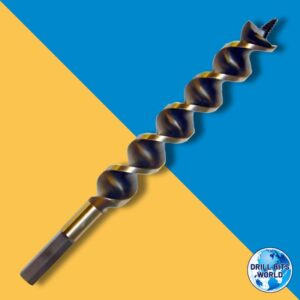Drill Bits for Electricians

High-Performance Drill Bits for Electricians
Electricians need tools that work as hard as they do. At Drill Bits World, we offer a specialized selection of drill bits built specifically for electrical work—whether you’re installing conduit, mounting panels, or fishing wire through tough-to-reach spaces.
Why Electricians Need Specialized Drill Bits
General-purpose bits just don’t cut it when you’re drilling through studs, metal boxes, or concrete block. Our electrician-grade bits are designed for:
- Faster, cleaner cuts through wood, plastic, and metal
- Reduced tear-out in finished surfaces
- Easier access to tight or awkward areas
Whether you’re a residential installer or handling industrial systems, we’ve got what you need to get the job done right.
Most Common Drill Bits for Electrical Work
Step Bits: Ideal for drilling into metal electrical panels or boxes with clean, burr-free holes.
Auger Bits: Used for running wire through wood studs quickly and efficiently.
Spade Bits: Great for fast, rough holes in wood—perfect for remodeling jobs.
Fish Bits / Flex Bits: Designed for drilling through finished walls and pulling wire.
Extra Long Bits: Reach behind drywall, above ceilings, and through stacked studs without needing extensions.
Best Step Bits for Electrical Panels
When drilling through steel electrical boxes or breaker panels, precision matters. Step drill bits let you drill multiple hole sizes with a single bit—saving time and reducing clutter in your toolbox.
Why Step Bits Are a Must-Have:
- Cut clean holes in metal with minimal effort
- Deburr while drilling—no extra step needed
- Prevent damage to wire insulation from jagged edges
Look for high-speed steel or titanium-coated bits for extended life and reduced wear.
Drill Bits for Running Wire Through Studs
Running Romex or low-voltage wire through studs? Auger and spade bits are your go-to tools. These bits power through wood with ease while maintaining clean hole walls that won’t damage cable.
Recommended Bit Types:
- Auger Bits: For long holes through multiple studs
- Spade Bits: For quick jobs and tight spaces
Tip: Choose a bit with a self-feed tip for smoother drilling and less effort.
Extra Long Drill Bits for In-Wall Electrical Work
When standard bits just can’t reach, extra long drill bits save the day. Perfect for fishing wire behind drywall or across long spans in ceilings or flooring systems.
Benefits of Extra Long Bits:
- Reach 18″ to 48″ without extensions
- Avoid tearing open walls unnecessarily
- Designed for wood, plaster, or soft masonry
Use with right-angle drills or extensions to navigate around obstructions.
Drill Bits for Electricians: FAQ's
What is an electrical bit?
An "electrical bit" refers to a drill bit designed specifically for electrical work, such as wire routing or panel installation.
What do electricians use to drill holes?
Electricians typically use cordless power drills paired with step bits for metal, spade bits for wood, or fish bits for running wire.
What drill bit do electricians use?
Step bits, auger bits, spade bits, and extra-long flex bits are most commonly used by electricians.
What’s the difference between a spade bit and an auger bit?
Spade bits are faster but rougher. Auger bits are slower but cleaner and better for deep or repeated stud drilling.
Do I need extra long drill bits for fishing wire?
Yes. Extra long bits (18" to 48") help reach behind walls, above ceilings, or through multiple framing layers without opening up drywall.
What size step drill bit do I need for conduit?
Most electricians use a step bit that covers 3/4" to 1-1/8" sizes for standard conduit fittings. Always check local code and fitting requirements.
Can I use regular drill bits for electrical work?
While possible, regular bits often cause tear-out or aren’t long enough. Electrician-specific bits are designed for clean, efficient cuts and tight spaces.
What type of drill bit is best for electricians?
Electricians often use step bits, auger bits, spade bits, and extra long bits. The right bit depends on the material being drilled and the job—metal boxes, wood studs, or finished walls.

